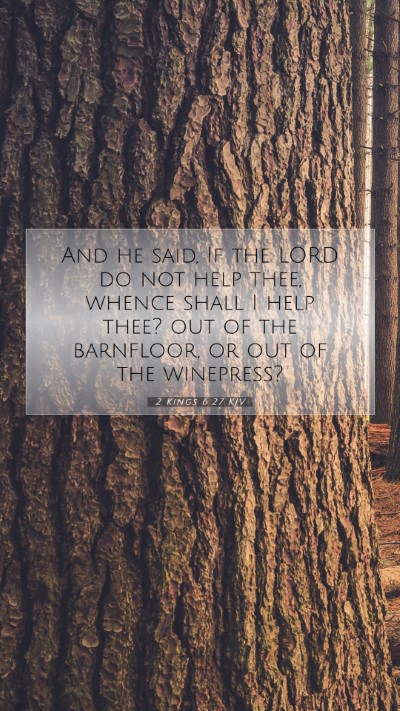Understanding 2 Kings 6:27
Bible Verse: 2 Kings 6:27 - "And he said, If the Lord do not help thee, whence shall I help thee? out of the barnfloor, or out of the winepress?"
This verse arises in a tumultuous context in which the city of Samaria is besieged, leading to dire circumstances such as famine and desperation among the people. The response from the king highlights the utter helplessness of human aid when the divine presence is absent.
Commentary Insights
- Matthew Henry: Henry emphasizes the spiritual implications of seeking help from God. He argues that in times of crisis, human resources can be entirely insufficient without divine intervention. The king's rhetorical question underscores a crucial truth: if God's help is not present, no other assistance will suffice.
- Albert Barnes: Barnes notes that the king shows a profound understanding of the principle that true relief and salvation come from the Lord. The imagery of the "barnfloor" and "winepress" communicates that even the most basic and vital resources are rendered useless without God's blessing. In desperation, society may call upon these things when they should instead call upon God.
- Adam Clarke: Clarke points out that this verse reveals the desperate state of the people in Samaria. He highlights that the question of help reflects not only a physical scarcity but also a spiritual desolation. Clarke's commentary stresses that in acknowledging the Lord's role, we recognize the futility of looking for aid in material pursuits when faced with overwhelming adversity.
Meaning and Application
2 Kings 6:27 serves as a stern reminder of the limitations of human effort in the absence of God's assistance. The verse invites readers to reflect on where they seek help in times of trouble. It encourages a deeper understanding of the necessity of relying on God, especially in crises where earthly resources have failed.
Broader Scriptural Context
This passage is situated within a narrative that illustrates the severity of the siege on Samaria, which was not just a physical ordeal but a profound spiritual challenge for the Israelites. For groups studying scriptures, it prompts discussions on how we confront our spiritual droughts today.
Related Cross References
- Psalm 121:1-2: "I will lift up my eyes to the hills— from where does my help come? My help comes from the Lord, who made heaven and earth."
- Isaiah 41:10: "Fear not, for I am with you; be not dismayed, for I am your God; I will strengthen you, I will help you; I will uphold you with my righteous right hand."
- James 1:5: "If any of you lacks wisdom, let him ask of God, who gives to all generously and without reproach, and it will be given to him."
Conclusion
In studying 2 Kings 6:27, one gains not just an understanding of a dire historical event but also insight into the timeless principle that our trust must be placed in God alone. This understanding empowers believers in their Bible study groups, enhancing their Bible study lessons and promoting Biblical exegesis that recognizes God's sovereignty.
This commentary encourages deeper Bible verse interpretations and enhances our Bible verse understanding resulting in better Bible study insights and practical applications that are relevant in today's world.


